Who invented numbers 0 1 2 3… (Hinduism) | Who invented numbers 0-9 | Only zero was invented by Indians?
Namaste friends, how are you doing today? Welcome to #BhagavanBhakthi website / blog.
Bhagavan Lord Sri Krishna (Vishnu) (Rama) blessings to you and your family!
In this website / blog, you will always learn about #Hinduism #Sanskrit language.
Also subscribe to my YouTube channel from this link #BhagavanBhakthi to view videos about #Hinduism #Sanskrit language.
Just before going to “Who invented numbers 0 1 2 3… (Hinduism) | Who invented numbers 0-9 | Only zero was invented by Indians?“, let us know a brief, basic and very important information.
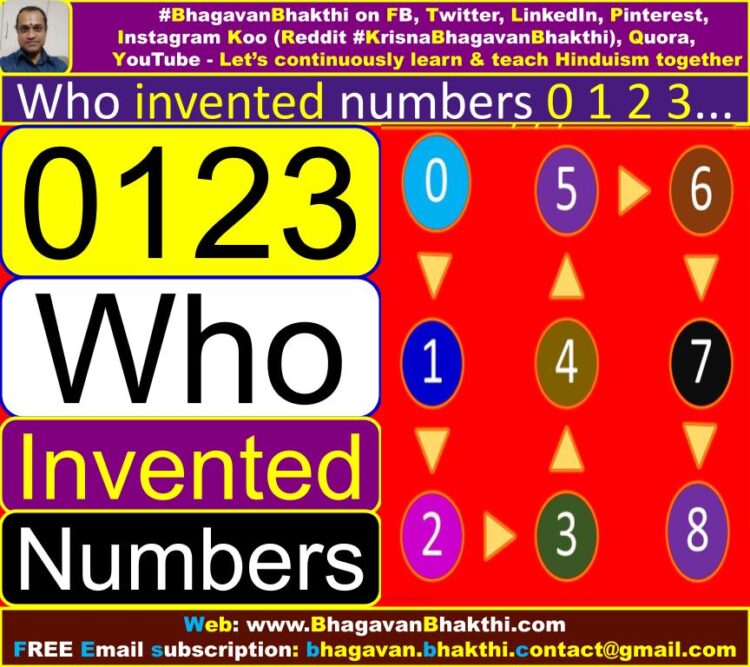
The real inventor of everything of the unlimited universes is, that is, Sri Krishna / Vishnu.
Lord Sri Vishnu is the ultimate and he knows anything and everything. I am not talking anything religious here. Let’s move forward.
In India and all over the whole world people still think that only ‘zero’ was given by Indians to the world and not the all the numerals.
But is it correct? Let us know about this now.
But in fact the numerals starting from minus infinity (- ∞) to plus infinity (+ ∞) was given to the whole world by Bharatiya vaasis (Indians).
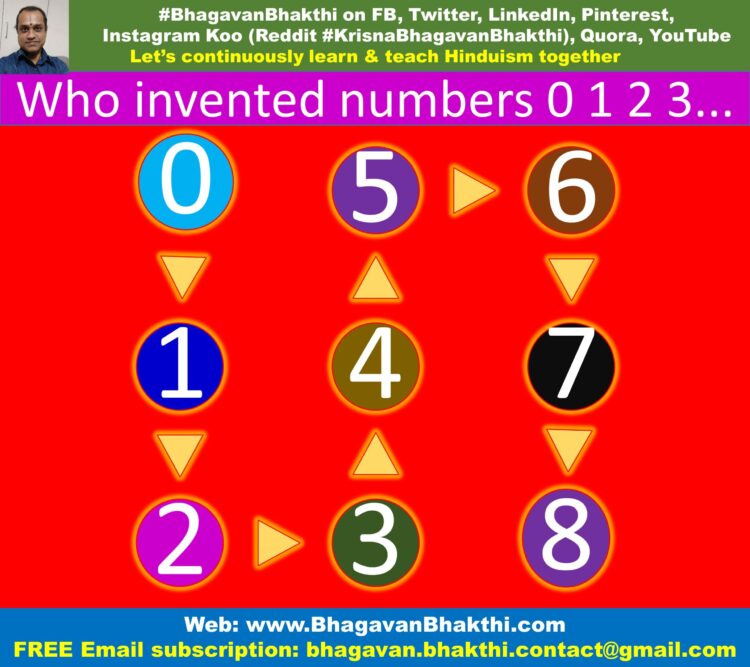
And not only this, also, all the numerals were used by Bharatiyas (Indians) since unknown time.
Yes, the question you have is right. How is it so? or How is it possible?
Just before moving forward, let’s know few of the points about Hindu Sanatana Dharma history:
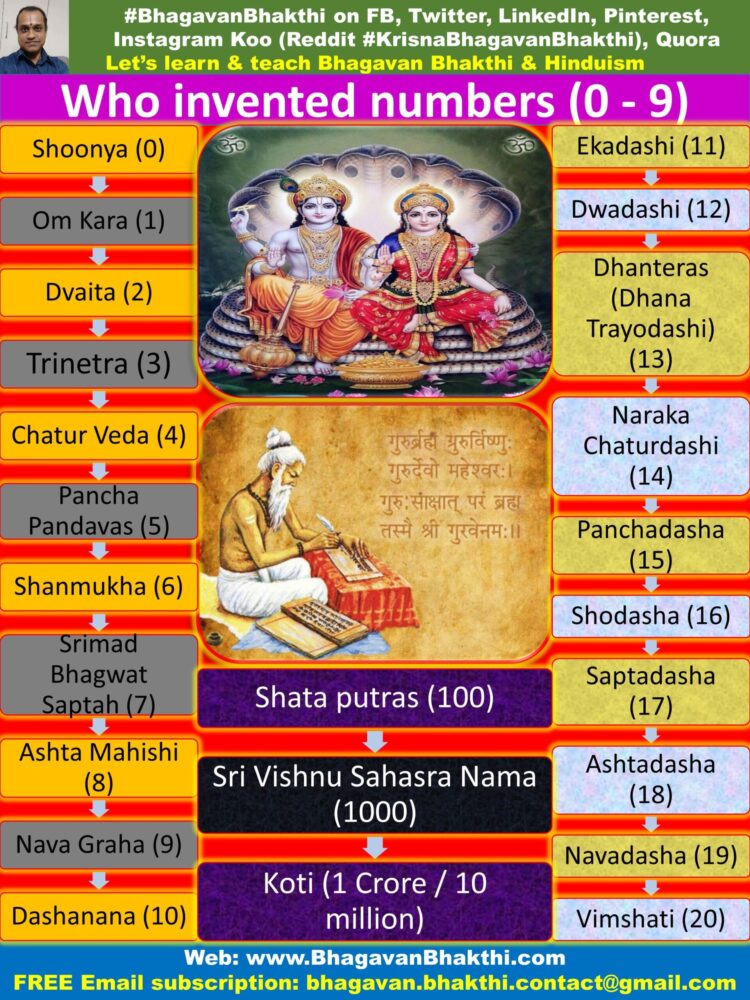
List of points to know about “Who invented numbers (0 – 9)” are as given below:
Shoonya (0) : Lord Vishnu is also known as ‘Shoonya’. He is someone who is present since the unknown time.
In Sanskrit ‘0’ means Shoonya. Hindus are aware of the number ‘0’ since unknown time.
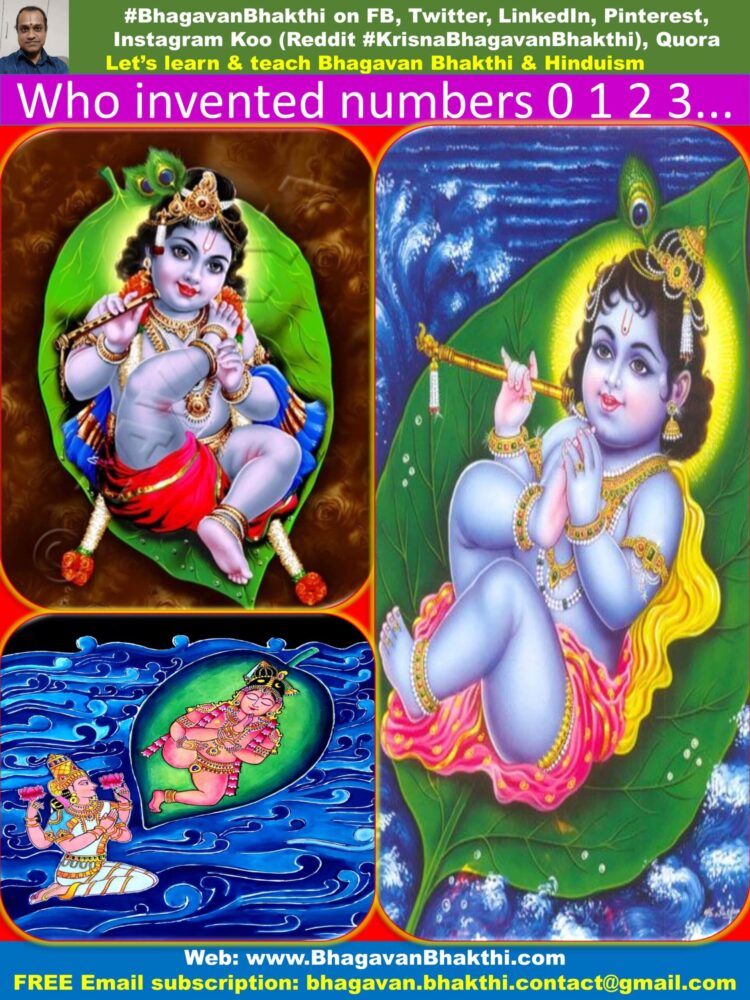
Om Kara (1) : Om represents the first ‘pranava mantra’. This is the ‘prathama (first)’ mantra.
In Sanskrit ‘1’ eka (ekam) means ‘1’. Hindus are aware of the number ‘1’ since unknown time.
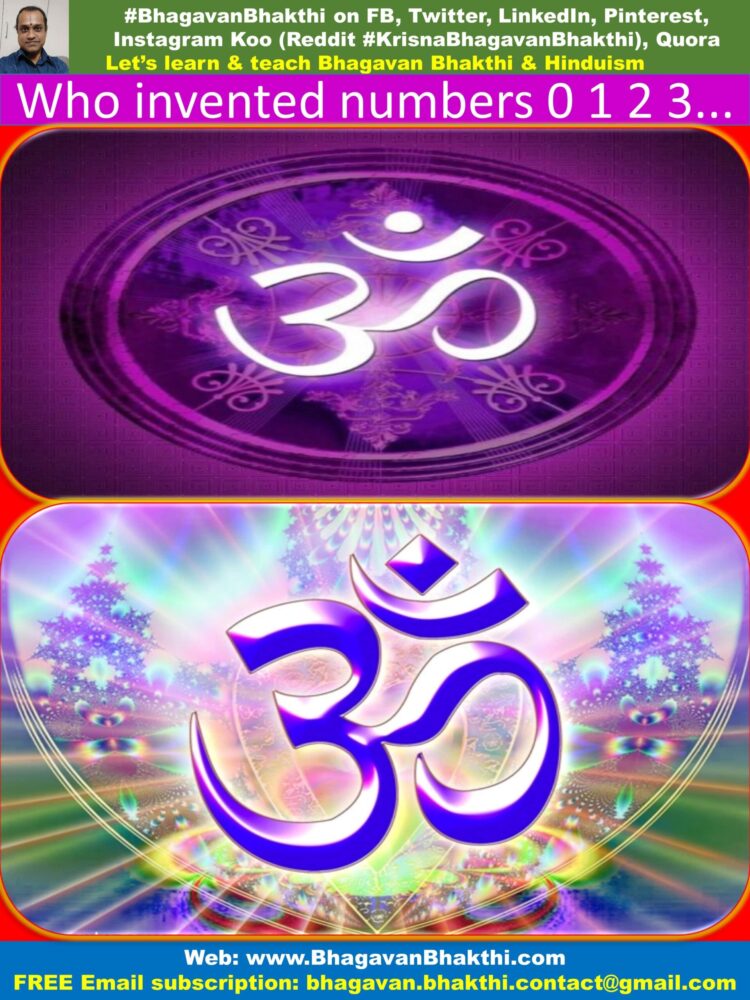
Dvaita (2) : Sri Madhvacharya Ji has said no two things or living beings can be same, but all are unique in their nature.
In Sanskrit ‘Dva or Dvi’ means ‘2’. Hindus are aware of the number ‘2’ since unknown time.
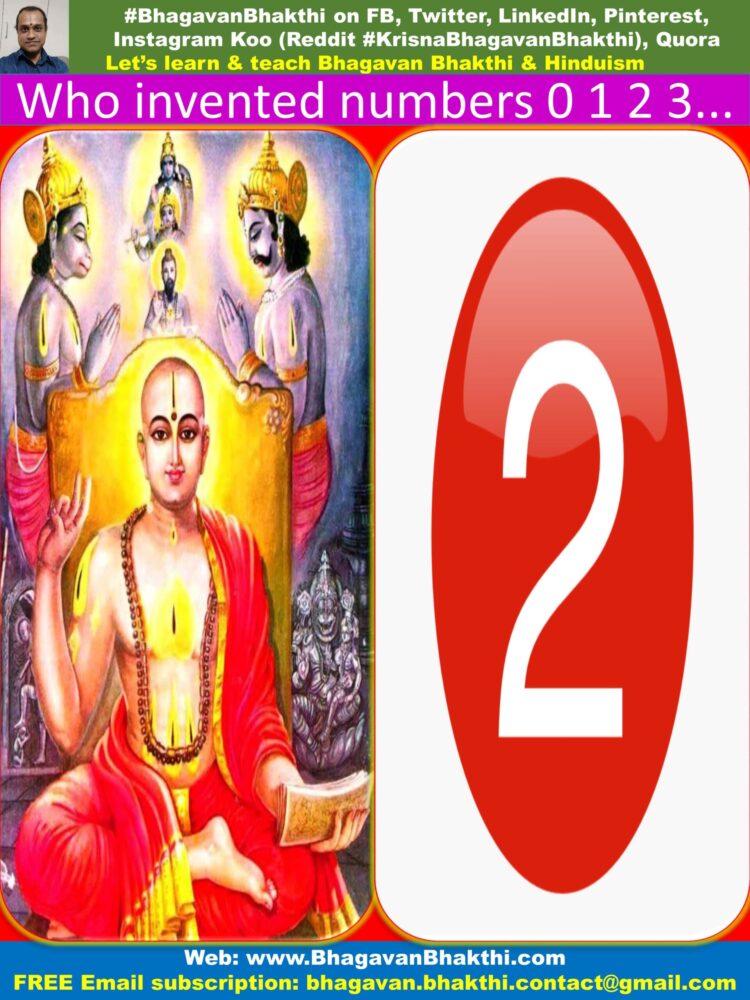
Trinetra (3) : Lord Shiva is known as Trinetra, that is, he is someone who has three eyes.
In Sanskrit ‘tri’ means three. Hindus are aware of number ‘3’ since unknown time.
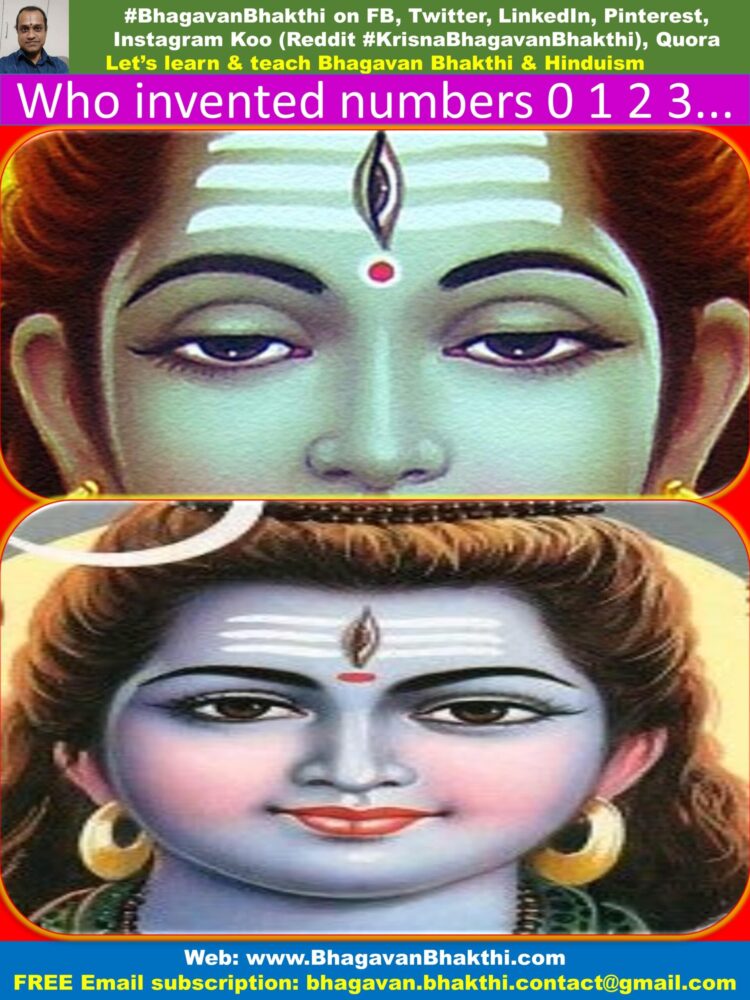
Chatur Veda (4) : All the four Vedas together are called as ‘Chatur Veda’.
In Sanskrit ‘chatur’ means ‘4’. Hindus are aware of the number ‘4’ since unknown time.
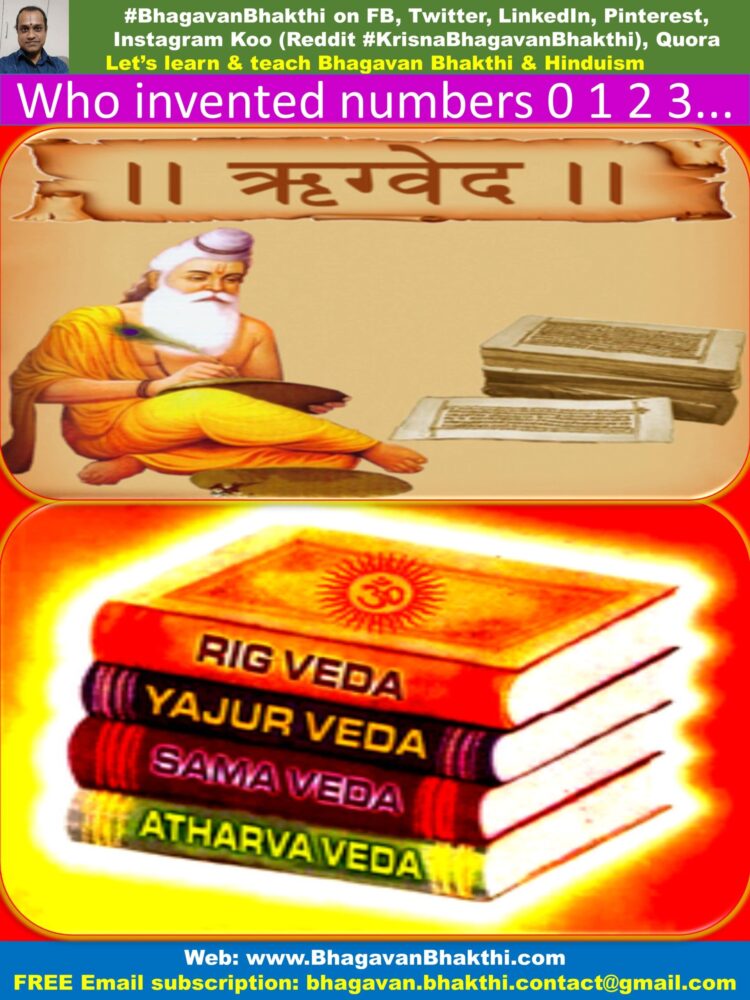
Pancha Pandavas (5) : Five Pandavas are known as ‘Pancha Pandavas’.
In Sanskrit ‘pancha’ means ‘5’. Hindus are aware of the number ‘5’ since unknown time.
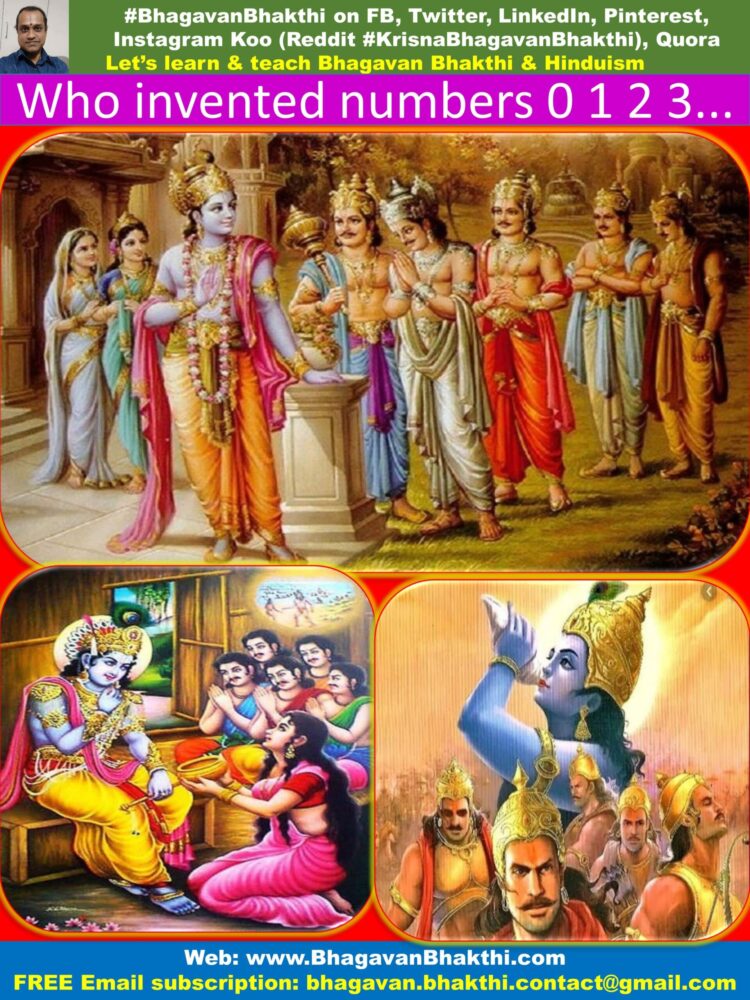
Shanmukha (6) : The Hindu Devata (Demigod) Lord Kartikeya is also called as Shanmukha, as he is having 6 faces.
In Sanskrit ‘Shan’ means ‘6’. Hindus are aware of the number ‘6’ since unknown time.
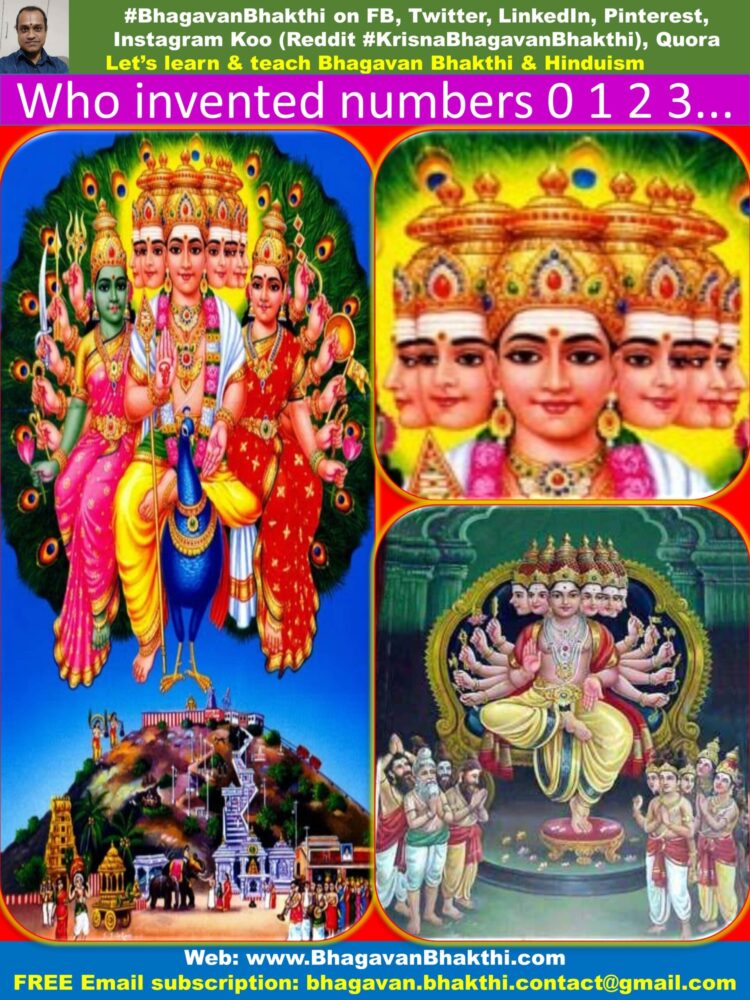
Srimad Bhagwat Saptah (7) : Rishi Shukacharya Ji (Shuka Muni) preached Srimad Bhagavatam to Parikshit Maharaj in seven days.
And thus those 7 days were known as ‘Saptah’ or ‘Srimad Bhagwat Saptah’.
Here Saptah means ‘7’. Also we have saptarishi (7 Rishis / Sages) etc.
In Sanskrit ‘sapta’ means ‘7’. Hindus are aware of the number ‘7’ since unknown time.
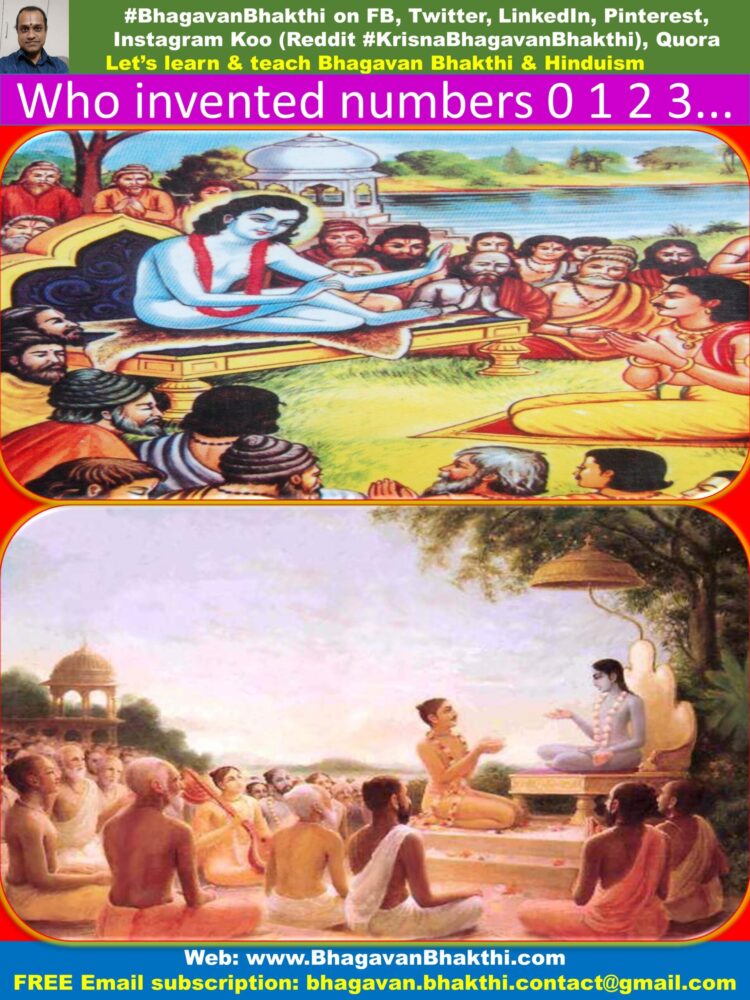
Ashta Mahishi (8) : Lord Krishna’s first 8 consorts are known as Ashta Mahishi. Here Ashta means 8.
In Sanskrit ‘ashta’ means ‘8’. Hindus are aware of the number ‘8’ since unknown time.
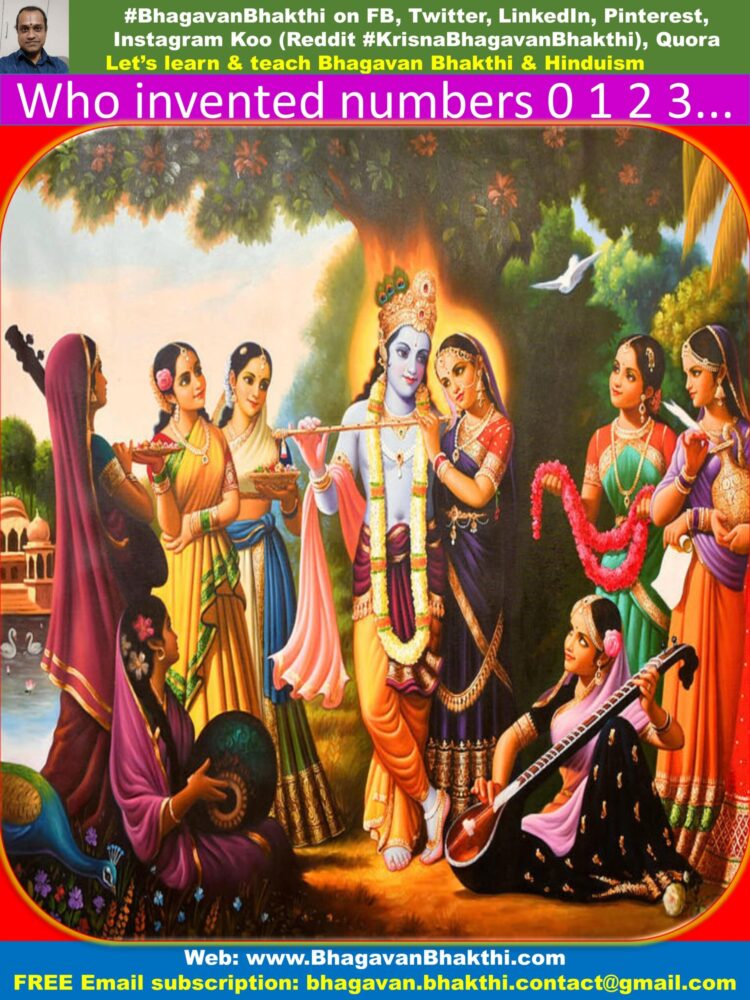
Nava Graha (9) : As per Hinduism, we have 9 grahas (planets) called as Nava Grahas.
In Sanskrit ‘nava or navama’ means ‘9’. Hindus are aware of the number ‘9’ since unknown time.
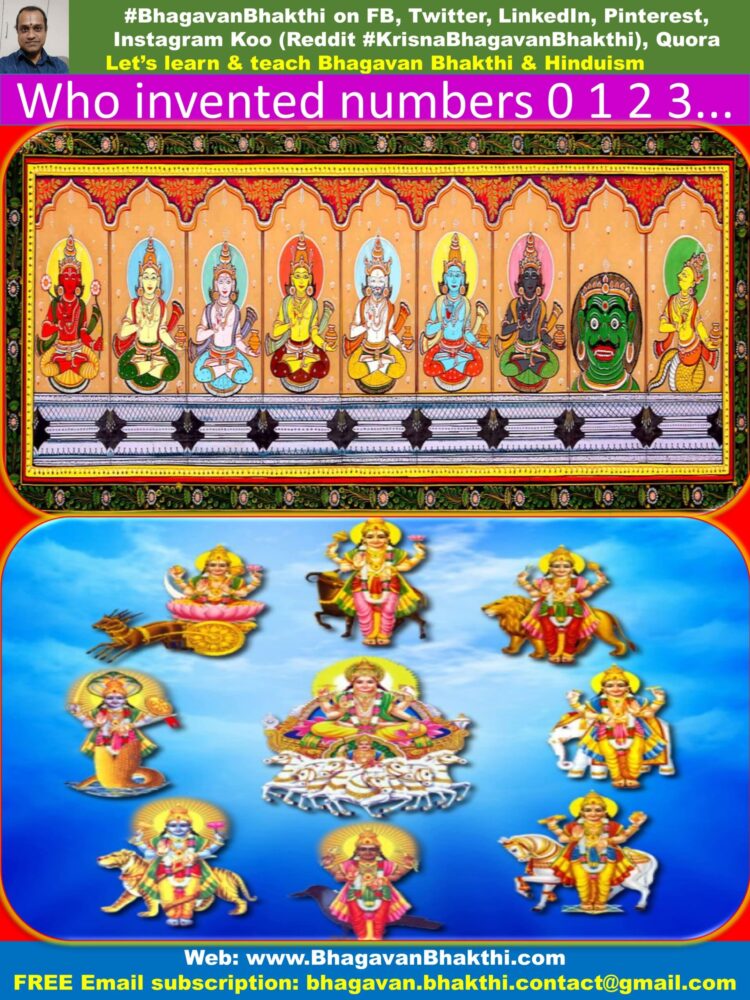
Dashanana (10) : The king of Lanka Ravana is called as ‘Dashanana’ as he had 10 heads.
Here Dasha means 10 in Sanskrit. Hindus are aware of the number ’10’ since unknown time.
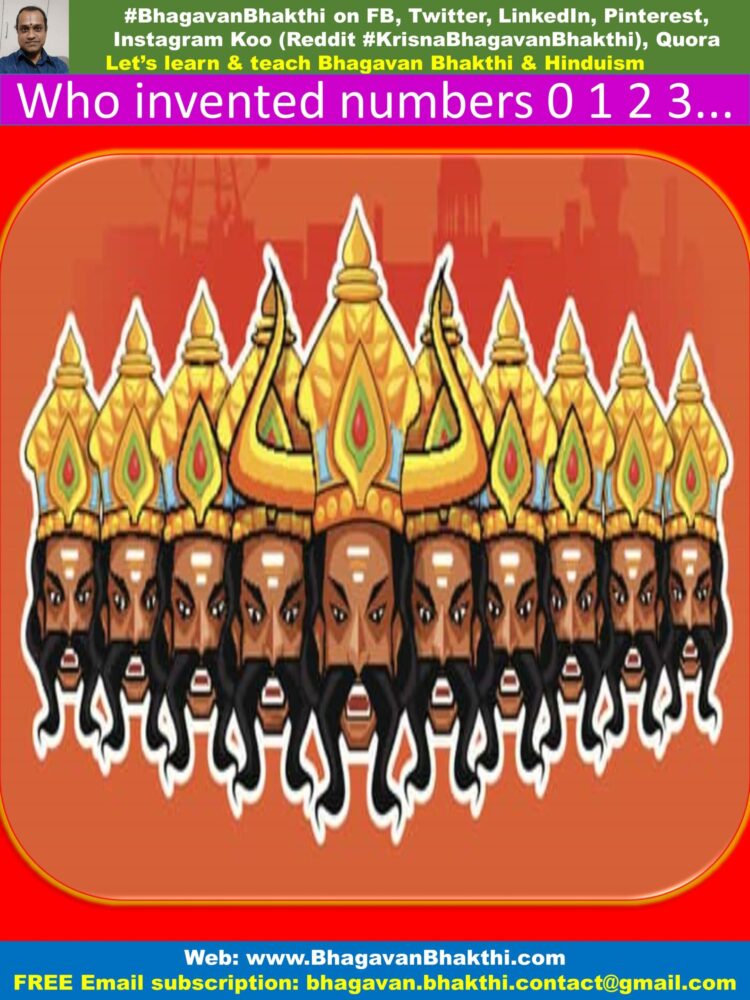
Ekadashi (11) : Many followers of Lord Vishnu (Krishna / Rama) do fasting on the eleventh day of every fortnight.
Ekadashi means ’11’ in Sanskrit. Hindus are aware of the number ’11’ since unknown time.
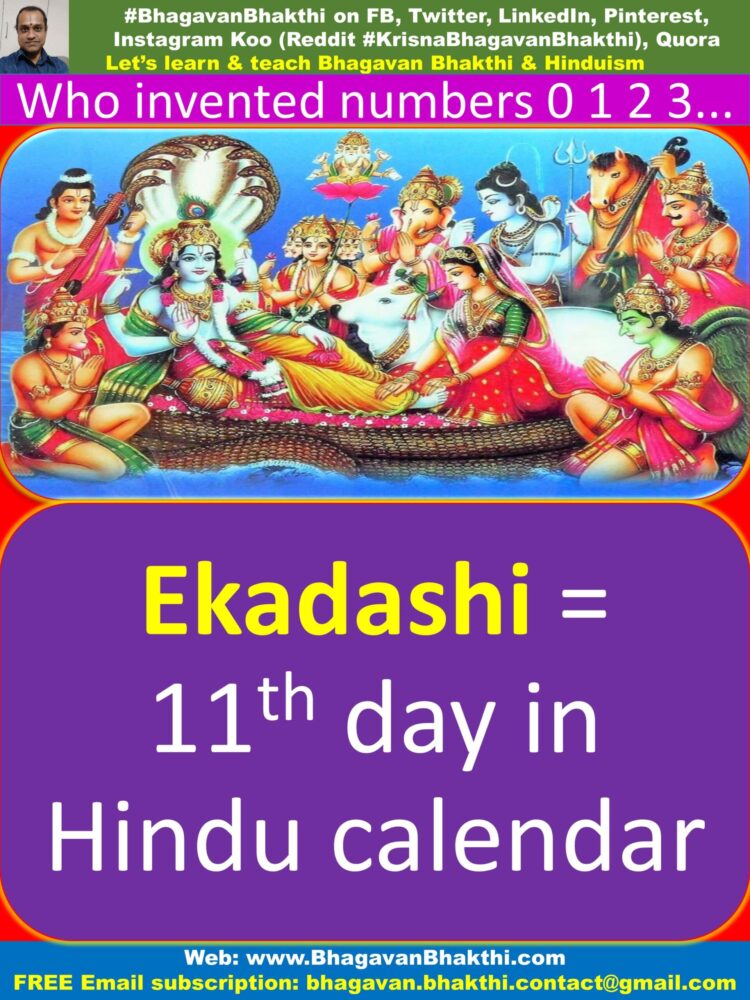
Dwadashi (12) : Sri Madhvacharya Ji has written a stotram called ‘Dwadasha Stotram’.
Here Dwadasha in Sanskrit means ’12’. Hindus are aware of the number ’12’ since unknown time.
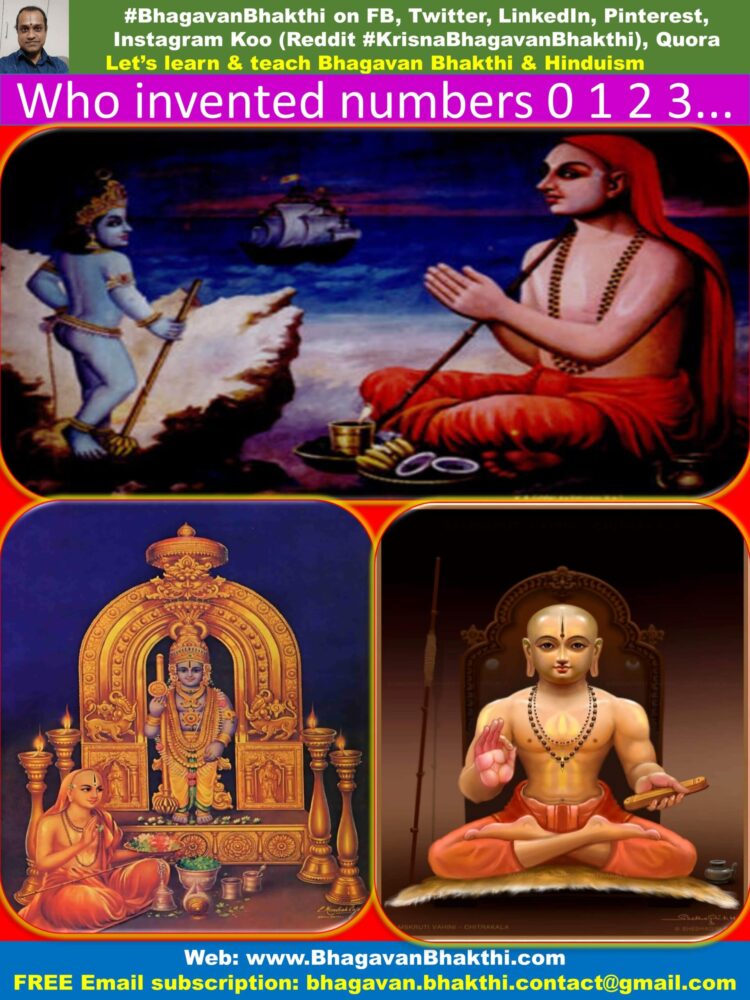
Dhanteras (Dhana Trayodashi) (13) : Diwali (Deepawali) (Dhanteras or Dahana Trayodashi) is celebrated on the thirteenth day of the Kartika month.
In Sanskrit Trayodashi means ’13’. Hindus are aware of the number ’13’ since unknown time.
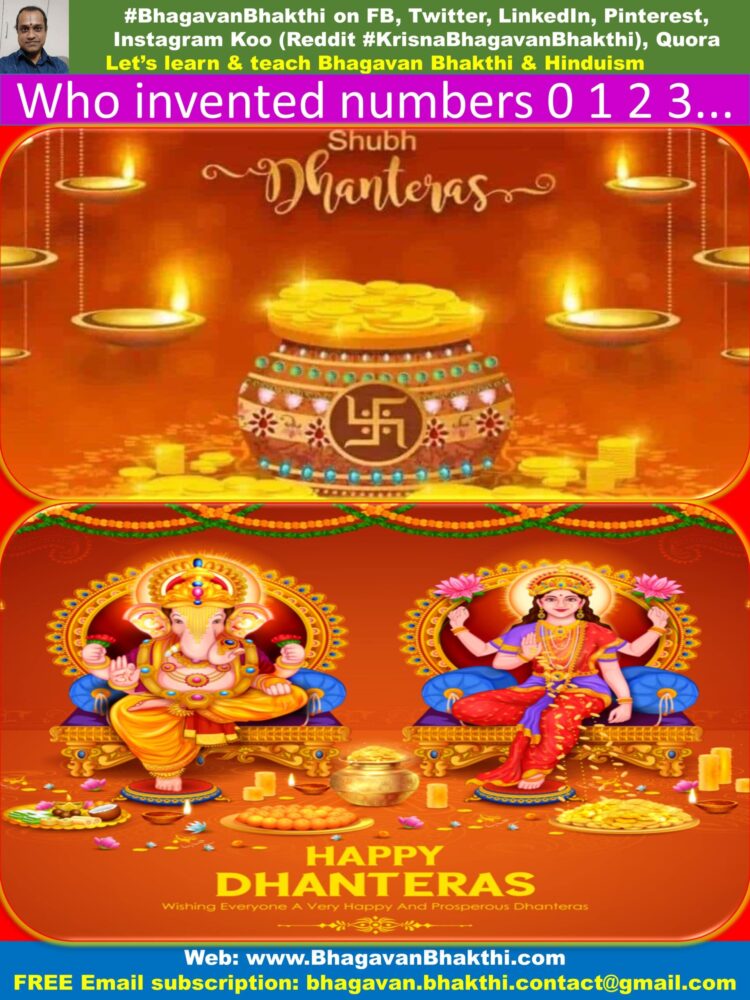
Naraka Chaturdashi (14) : Diwali (Deepawali) is also celebrated on the fourteenth day of the Kartika month as Naraka Chaturdashi.
As on this day Lord Krishna slayed down the demon called Narakasura.
In Sanskrit ‘chaturdashi’ means ’14’. Hindus are aware of the number ’14’ since unknown time.
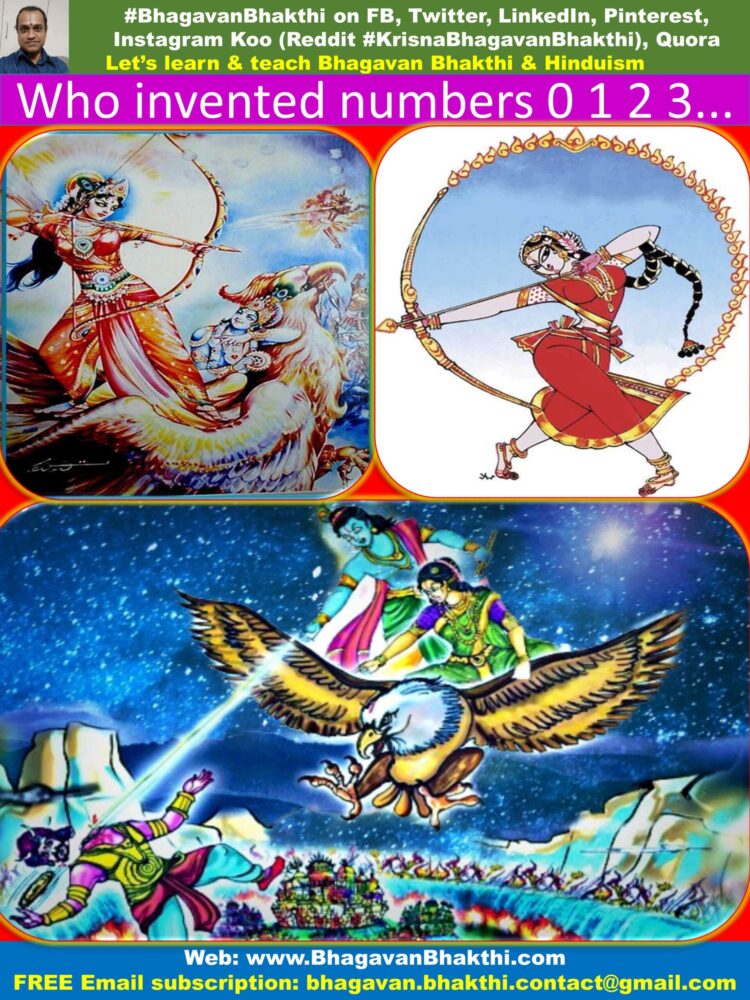
Panchadasha (15) : In Sanskrit Panchadasha means ’15’. Hindus are aware of the number ’15’ since unknown time.
Shodasha (16) : In Sanskrit Shodasha means ’16’. Hindus are aware of the number ’16’ since unknown time.
Saptadasha (17) : In Sanskrit Saptadasha means ’17’. Hindus are aware of the number ’17’ since unknown time.
Ashtadasha (18) : In Sanskrit Ashtadasha means ’18’. Hindus are aware of the number ’18’ since unknown time.
Navadasha (19) : In Sanskrit Navadasha means ’19’. Hindus are aware of the number ’19’ since unknown time.
Vimshati (20) : In Sanskrit Vimshati means ’20’. Hindus are aware of the number ’20’ since unknown time.
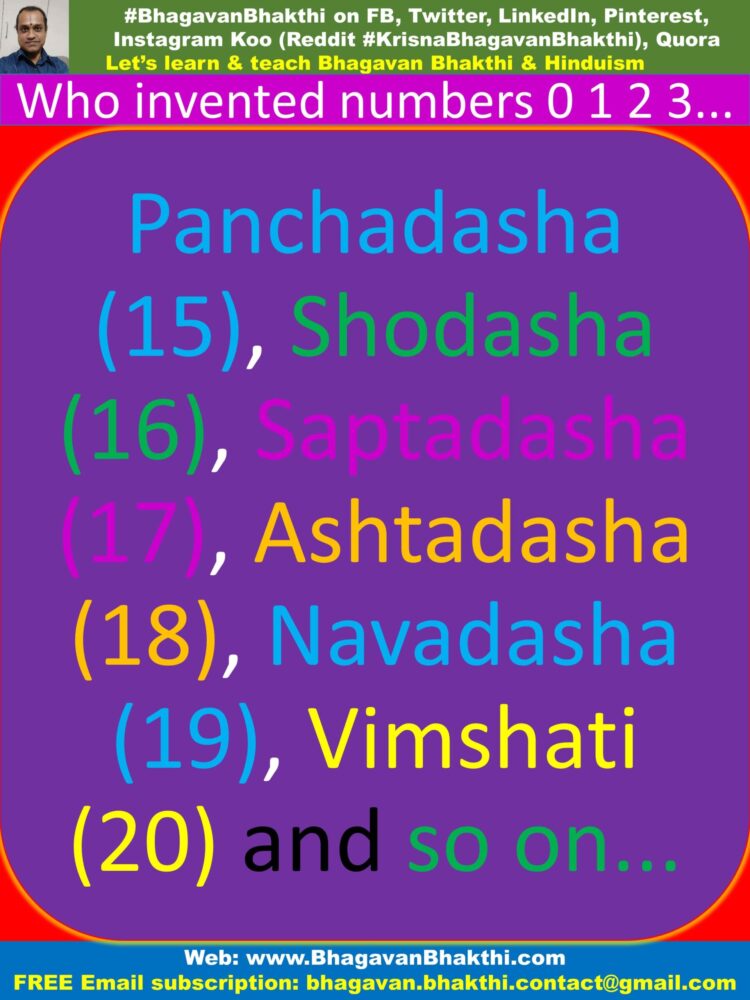
Shata putras (100) : Gandhari and Dhritarashtra were the parents of 100 sons.
In Sanskrit Shata means ‘100’. Hindus are aware of the number ‘100’ since unknown time.
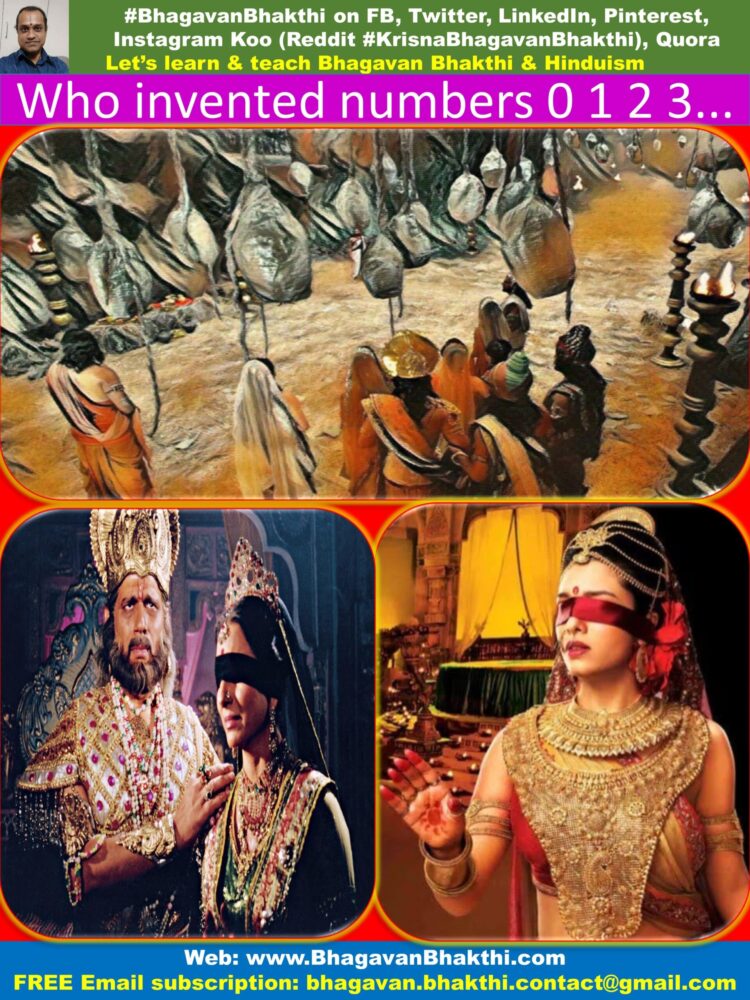
Sri Vishnu Sahasra Nama (1000) : Lord Vishnu’s Sri Vishnu Sahasra Nama has 1000 names of Lord Vishnu.
In Sanskrit Sahasra means ‘1000’. Hindus are aware of the number ‘1000’ since unknown time.
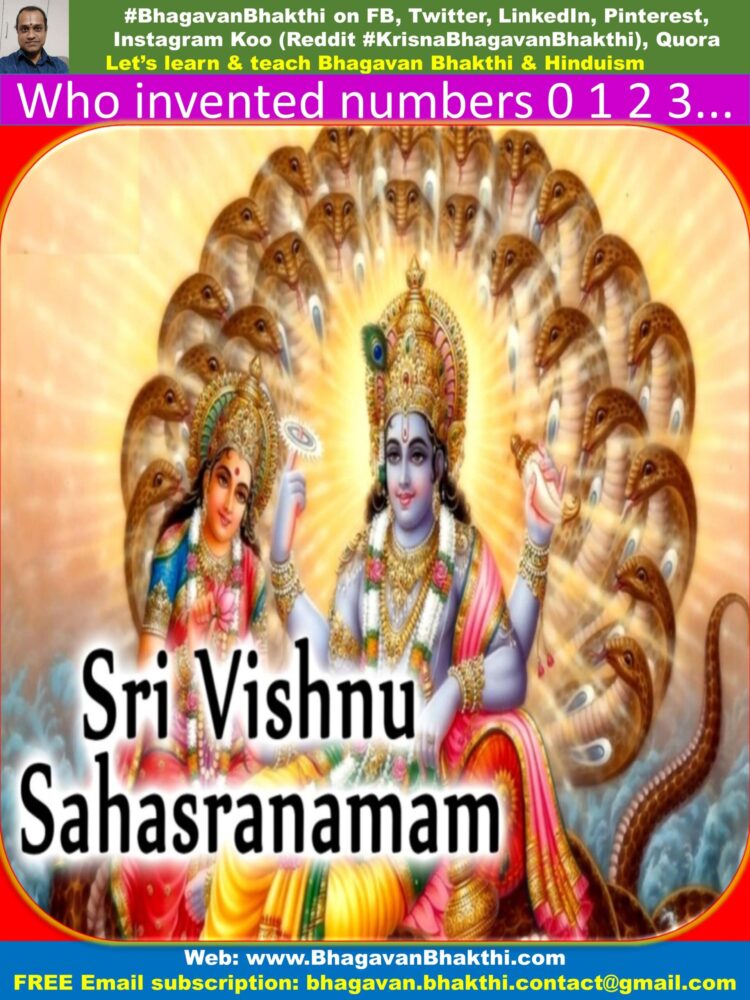
Koti (1 Crore / 10 million) : In Sanskrit Koti means 1 Crore or 10 million.
Hindus are aware of the number ‘1,00,00,000’ since unknown time.
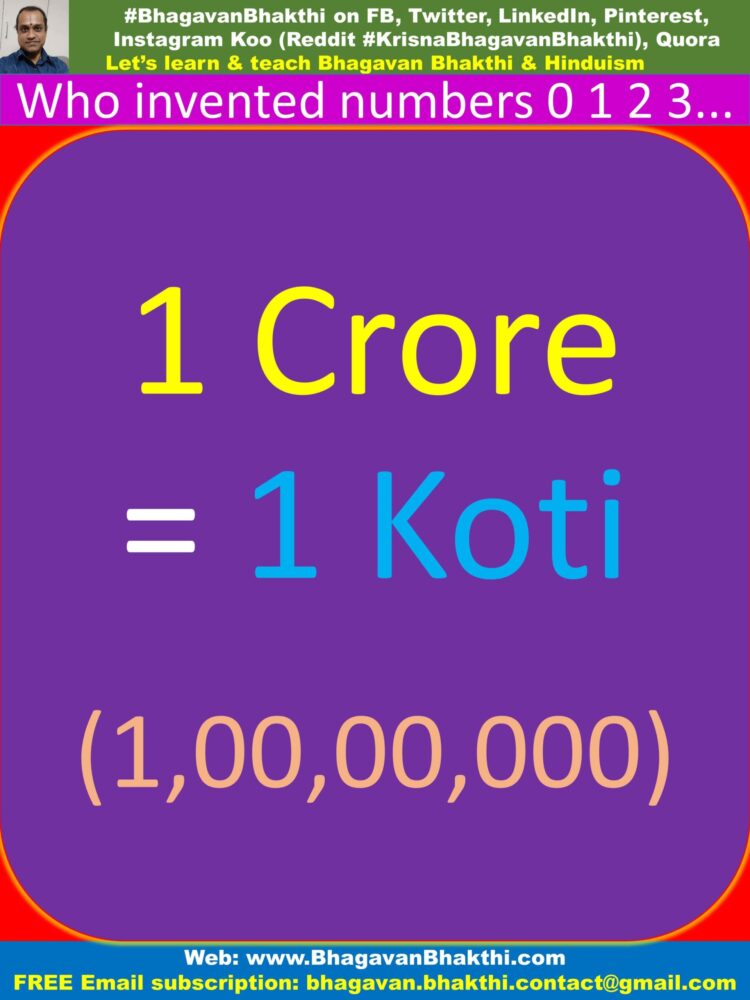
Thus the counting goes on and on and on… as per Hindu Sanatana Dharma.
To know the full numerals of Sanskrit (Hinduism / Sanatana Dharma), please visit the below link:
What is Hindu (Sanskrit) number system
Now, let know more information about the numbers as given below:
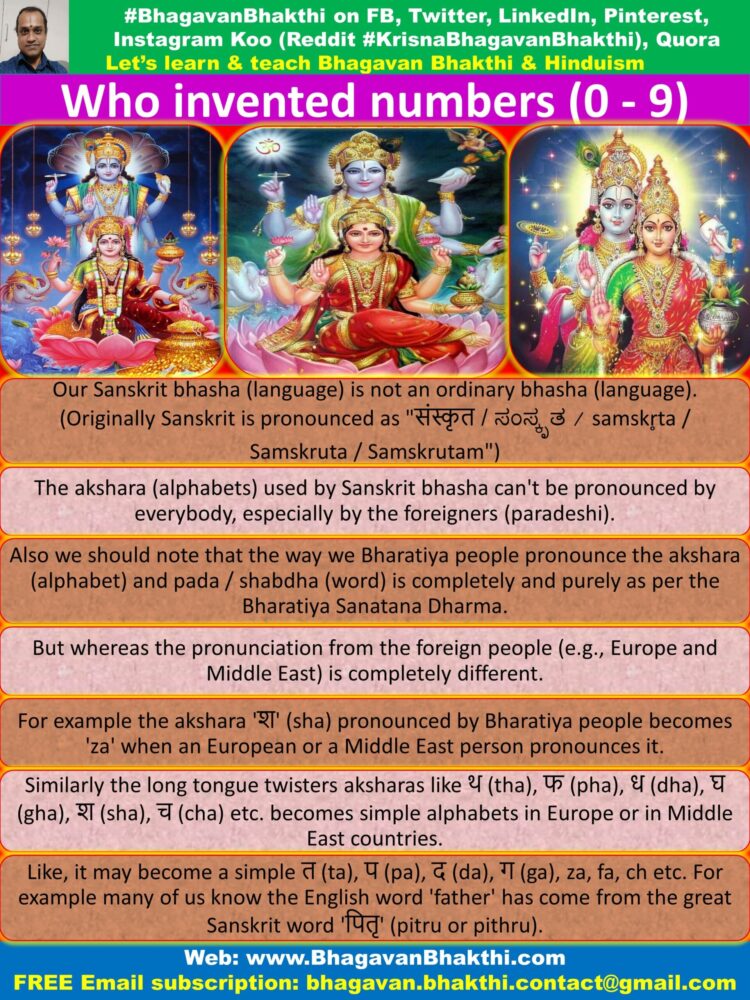
Let us analyze the numerals starting from zero of the Roman words:
But before going to the next step we need to understand few points.
Our Sanskrit bhasha (language) is not an ordinary bhasha (language).
(Originally Sanskrit is pronounced as “संस्कृत / ಸಂಸ್ಕೃತ / samskr̥ta / Samskruta / Samskrutam”)
The akshara (alphabets) used by Sanskrit language can’t be pronounced by everybody, especially by the foreigners (paradeshi).
Also we should note that the way we Bharatiya (Indian) people pronounce the akshara (alphabet) and pada / shabdha (word) is completely and purely as per the Bharatiya (Indian) Sanatana Dharma.
But whereas the pronunciation from the foreign people (e.g., Europe and Middle East) is completely different.
For example the akshara (alphabet) ‘श’ (sha) pronounced by Bharatiya (Indian) people becomes ‘za’ when an European or a Middle East person pronounces it.
Similarly the long tongue twisters aksharas like थ (tha), फ (pha), ध (dha), घ (gha), श (sha), च (cha) etc. becomes simple alphabets in Europe or in Middle East countries.
Like, it may become a simple त (ta), प (pa), द (da), ग (ga), za, fa, ch etc.
For example many of us know the English word ‘father’ has come from the great Sanskrit word ‘पितृ’ (pitru or pithru).
Here we can easily note that the English people were are not able to pronounce the Sanskrit akshara ‘पि’, instead they pronounce it as ‘fa’.
This is similar to the Sanskrit words ‘mathru’ which became mother in English and also ‘bhatru’ has become brother in English.
Similarly there are so many alphabets and words which can’t be pronounced by Europeans or the Middle East people easily.
(Here I am considering only two parts of the world.)
(But it doesn’t mean that other parts of the world apart from India pronounce the alphabets or words correctly.)
(No, even other parts of the world also pronounce the alphabets and words incorrectly).
After little of understanding let us again go back to the understanding of the Roman numerals –
which are nothing but the mispronounced versions of the great Bharatiya bhasha (Indian language) words.
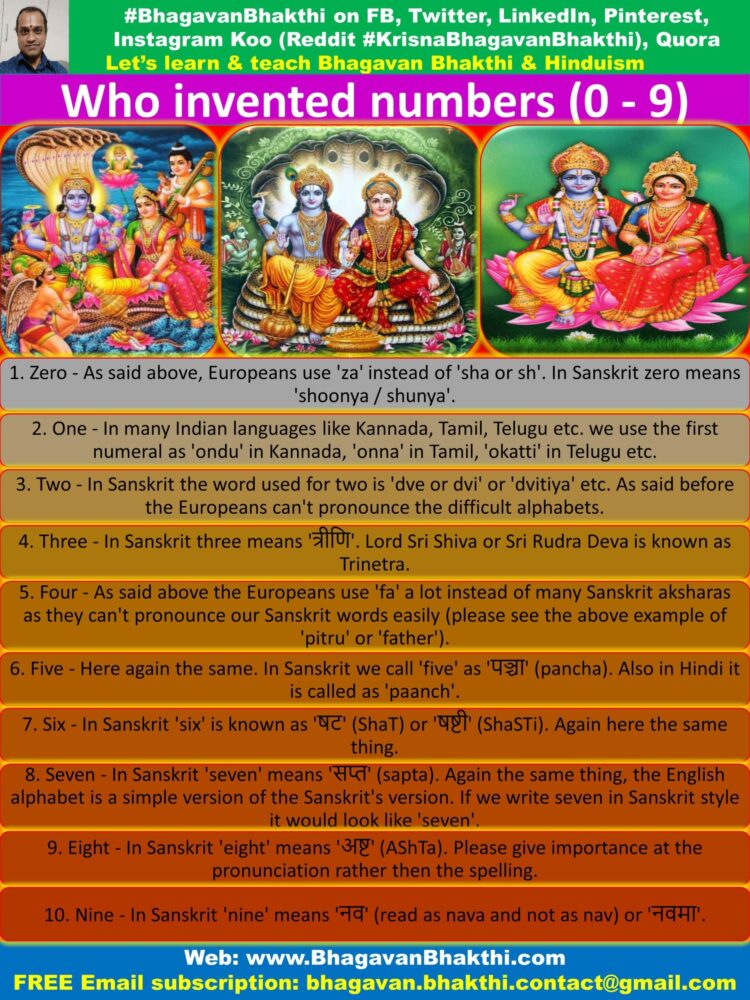
1. Zero – As said above, Europeans use ‘za’ instead of ‘sha or sh’. In Sanskrit zero means ‘shoonya / shunya’.
It is very clear that the English word ‘zero’ has been a mispronounced word from the Sanskrit language word ‘shoonya’.
2. One – In many Indian languages like Kannada, Tamil, Telugu etc. we use the first numeral as ‘ondu’ in Kannada, ‘onna’ in Tamil, ‘okatti’ in Telugu etc.
It is very clear that the English version of the one is directly taken from our the Bharatiya language itself.
If we write one in Sanskrit style it would look like ‘van or wan’.
In Sanskrit ‘Om’ means one. What more proof you need?
3. Two – In Sanskrit the word used for two is ‘dve or dvi’ or ‘dvitiya’ etc.
As said before the Europeans can’t pronounce the difficult alphabets.
Here ‘द्वे’ (dve) or ‘द्वि’ (dvi) or ‘द्वितीय’ (divitiya) is not easy for them to pronounce.
Thus they have mispronounced it and has kept it very very simple as ‘टवे’ (tave or tve).
That in fact has become two. (Also we should remember that Europeans use ‘ओ’ or O many times.
This, we can note from the word like ‘no’ is originated from the Sanskrit word ‘na’).
If we write two in Sanskrit style it would look like ‘tu’.
4. Three – In Sanskrit three means ‘त्रीणि’. Lord Sri Shiva or Sri Rudra Deva is known as Trinetra.
Means he has three eyes. Here it is very clear the English version of the ‘three’ is directly taken the Sanskrit language ‘त्री’ or ‘tri’.
If we write three in Sanskrit style it would look like ‘tri’.
5. Four – As said above the Europeans use ‘fa’ a lot, instead of many Sanskrit aksharas.
As they can’t pronounce our Sanskrit words easily (please see the above example of ‘pitru’ or ‘father’).
In Hindi we know that for ‘four’ we call it as ‘chaar / char’.
Thus the Roman numeral’s four has come from our Sanskrit version ‘चत्वारि or ‘chatvaari’ etc.
That is, the Roman numeral four is a simple version of the Sanskrit version.
If we write four in Sanskrit style it would look like ‘for’.
6. Five – Here again the same. In Sanskrit we call ‘five’ as ‘पञ्चा’ (pancha).
Also in Hindi it is called as ‘paanch’.
The English or Roman numeral is a simple version of the Sanskrit version.
If we write five in Sanskrit style it would look like ‘faiv’.
7. Six – In Sanskrit ‘six’ is known as ‘षट’ (ShaT) or ‘षष्टी’ (ShaSTi). Again here the same thing.
The English version of the ‘six’ is a mispronounced and also a very simple version of the Sanskrit version.
If we write six in Sanskrit style it would look like ‘siks’.
8. Seven – In Sanskrit ‘seven’ means ‘सप्त’ (sapta). Again the same thing, the English alphabet is a simple version of the Sanskrit’s version.
If we write seven in Sanskrit style it would look like ‘seven’.
9. Eight – In Sanskrit ‘eight’ means ‘अष्ट’ (AShTa).
Please give importance at the pronunciation rather then the spelling.
Ever easily we can note that the Roman numeral is a simple or mispronounced version of the Sanskrit version.
If we write eight in Sanskrit style it would look like ‘yaith or yait’.
10. Nine – In Sanskrit ‘nine’ means ‘नव’ (read as nava and not as nav) or ‘नवमा’.
Again it is very clear that the English version is a simpler form of the Sanskrit version.
If we write nine in Sanskrit style it would look like ‘nain’.
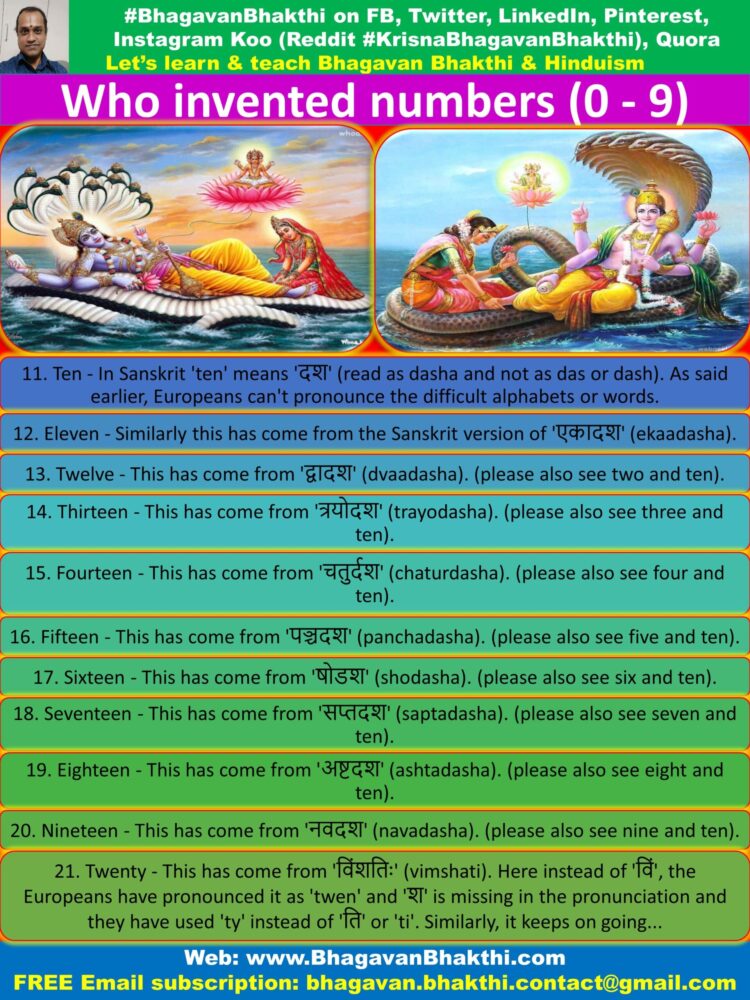
11. Ten – In Sanskrit ‘ten’ means ‘दश’ (read as dasha and not as das or dash).
As said earlier, Europeans can’t pronounce the difficult alphabets or words.
Here, instead of ‘द’ (da), the Romans or English people have pronounced it as simply ‘ta or te’.
12. Eleven – Similarly this has come from the Sanskrit version of ‘एकादश’ (ekaadasha).
13. Twelve – This has come from ‘द्वादश’ (dvaadasha). (please also see two and ten).
14. Thirteen – This has come from ‘त्रयोदश’ (trayodasha). (please also see three and ten).
15. Fourteen – This has come from ‘चतुर्दश’ (chaturdasha). (please also see four and ten).
16. Fifteen – This has come from ‘पञ्चदश’ (panchadasha). (please also see five and ten).
17. Sixteen – This has come from ‘षोडश’ (shodasha). (please also see six and ten).
18. Seventeen – This has come from ‘सप्तदश’ (saptadasha). (please also see seven and ten).
19. Eighteen – This has come from ‘अष्टदश’ (ashtadasha). (please also see eight and ten).
20. Nineteen – This has come from ‘नवदश’ (navadasha). (please also see nine and ten).
21. Twenty – This has come from ‘विंशतिः’ (vimshati).
Here instead of ‘विं’, the Europeans have pronounced it as ‘twen’ and ‘श’ is missing in the pronunciation and they have used ‘ty’ instead of ‘ति’ or ‘ti’.
Similarly, it keeps on going…
I know for some people it would not be easy to understand this or also many people may not accept this.
But if you know little bit of Sanskrit or your own any Indian languages, you should be able to understand this and also should be able to accept this.
But truth remains truth.
We need to understand that the first language on this earth was Sanskrit.
Later all the languages which came to this earth or which is been used on this earth is a copied, edited, mispronounced, corrupted etc. versions of the great Sanskrit language.
More information will be added to this on regular basis. Please visit this post after some time to get updated information.
To watch videos on #Hinduism #Sanskrit language, SUBSCRIBE to my YouTube channel from this below link:
#BhagavanBhakthi YouTube channel
To know more about the “numbers importance, significance, facts in Hinduism“, visit the below link:
Numbers importance, significance, facts in Hinduism
Dear friends, if you need any clarifications about this post, kindly let me know, I will definitely try to answer all of them.
Also your one LIKE, one COMMENT, One Share, one SUBSCRIPTION is highly important.
This will help to know the quality of this content and also it will be helpful to know if any improvements is required for the content.
If you feel this content is useful to you and has helped you to improve your knowledge, kindly share this with your well-wishers.
Because “SHARING MEANS CARING”.
For receive FREE EMAIL SUBSCRIPTION about #BhagavanBhakthi, you can send an email to [email protected] from your email ID.
NAMASTE!
Sri Samskruta bhasha ki jai
Sri Bharata maata ki jai
Sri Gurubhyo namaha
Sri Krishnaaya namaha
Sri Krishnaarpanamastu
Share in Social Media